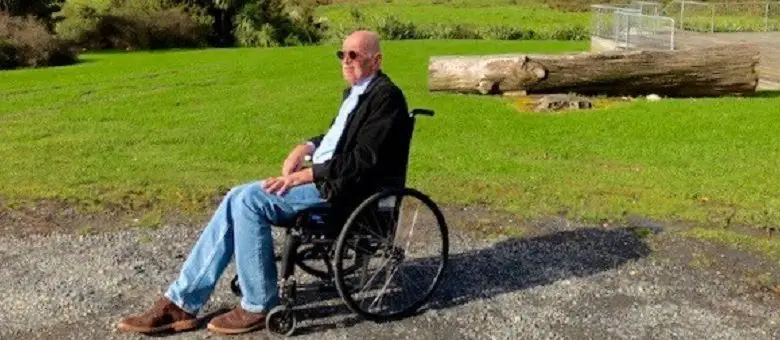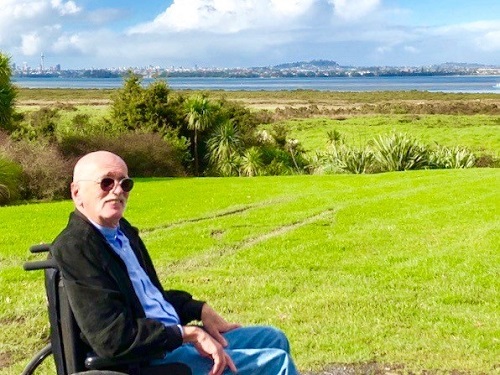
Surviving a stroke: living life to the fullest and travelling around the world
New Disability Horizons writer Wolf, who is from New Zealand, is about to embark on a four-month-long adventure as he travels to a number of cities across the world, including Madrid, Sicily, Berlin and New York. But before we hear about his travel triumphs and woes – of which there are always many when you’re disabled – he tells us about his life and becoming disabled after a stroke.
The years before my stroke seem quite distant now. Sure, they were a big part of my life. But nowadays they are just a memory. A pleasant memory!
I grew up in a refugee camp and council housing area, climbing the social ladder as I grew. I became a copywriter, then creative director of an international advertising agency. I also did a stint working in Los Angeles, California before finally setting up my own direct marketing agency in Auckland, New Zealand.


Because it was situated near my brainstem, the doctors ruled an operation out as too dangerous – it could have caused massive nerve damage and paralysis.
But I was excluded from this decision-making process as I was in a coma for 10 days. Once out of the coma, I was unable to speak or move. This is called locked-in-syndrome, a condition where the only muscle that works in the entire body is the eyelid.
In total, I spent four and a half months in hospital. I was moved around – from the clinical care unit to the intensive care unit, then to a single room and finally to an eight-bed ward.
I had a tracheotomy and every test under the sun, including a daily visit from my ‘personal vampire’, as I called the nurse who took my blood in order to determine the Heparin levels for my many injections to stop any more blood clots from forming.
Naturally, I was relieved when I got out off there.
Recovering from the stroke
After getting back home, I thought it was only a matter of time before I resumed my old life. That’s how it works, right? You have something wrong with you, you go to hospital, they fix you, and when you get out, you’re good to go. At least, that’s what I thought. How wrong I was.
Even now, 28 years later, there are quite a few things that aren’t quite right, no matter how hard I tried to correct them as I recovered.
The most visible effect of my stroke is the wheelchair, which I use because I have no, or only very little balance. I also have weakness on just one side of my body (called hemiparesis), sensation issues, and fatigue.
Apart from those, there are too many other annoying leftover issues to list here. You can learn more about the effects of a stroke by watching a talk I did for nursing students.
But what issues I still deal with, big or small, don’t really matter. The degree of physical injury does not determine the psychological response. In other words, someone can have a major injury and brush it off, while someone else might have a minor injury, and it have a rather catastrophic impact on them psychologically.
We can’t change our disability, but we can change the way we respond to it.
Not letting disability stand in my way
After rehabilitation I was determined to carry on, to do things I am passionate about, to better myself and help others who have been through similar experiences.
So I first wrote a book, called How To Survive After A Stroke. It’s out of print now, but a revised version is available as an e-book on Amazon. It is not only about my own experiences, but also other people’s. I have been told that it’s helped people gain a better understanding of stroke.
I also studied Social Practice, which is about the application of social science in day-to-day life. I studied full-time the first year, but when this got too tough, I did another five years part-time. After all this I got a BA majoring in counselling, and I also a diploma in Community Development.
Sporadically, I also write a blog called The Glass is Half Full, about disability, rehabilitation and social issues, to help people understand the effects a stroke can have. Taking that even further, I now also work as a counsellor and mentor for other disabled people, give talks to community groups and at international conferences, and give guest lectures to students.
Here’s an example of one I gave about the different stages of rehabilitation.
Lastly, and by no means least, is my pet project, my charity. It’s called Computers Against Isolation and it buys ex-lease computers and gives them to disabled New Zealanders at no cost to them.
One thing I noticed during my rehabilitation was that friends dropped off. There wewasnly a handful I saw occasionally, and only two I met up with regularly to have a cup of coffee or a bite to eat.
I believe that the reason for these disappearing friends was the fact that it wasn’t easy for me to go out anymore. To start with, I no longer drove, so I couldn’t just jump into the car. Also, after somewhere had been suggested, I’d have to phone and ask whether I’d be able to get in, or whether its toilet was accessible. In other words, spontaneity was gone.
This diminishing social contact made me even more appreciative of communication. And that’s why I set up the charity. Please have a look at the website. It explains in detail how the charity operates.
I encourage anyone to set up a charity like this in their home country – communication is so valuable and can have a big impact on someone’s life.
If you’d like to set something up, please do feel free to email me at wolfgangwolf@xtra.co.nz. I would be happy to assist.
My accessible adventures
Whenever I see people on TV with a disability travelling, I admire them – they’re getting out of their comfort zone and meeting people. But they often make it look so easy. Having travelled a lot since becoming disabled, I must say, it’s certainly not always straightforward! The world does not exactly make it easy to travel with a disability.
Today, I’m sitting here planning my adventure. It’s not a bucket-list trip, because I still plan to do lots of things and visit many places after. For me, it is about people. Meeting new people and seeing old friends who I haven’t seen for a long time.


For this trip, I will be away for almost four months. There are lots of things to organize: flights, hotel bookings, a ship sailing, parking placard, a Euro key for disabled toilets. My inability to take long-hand notes, my bad memory, my shortened attention span and my limited endurance often lead to frustration. This has resulted in me walking away from planning and giving it another go the next day.
So I decided I need help with it all. It’s not like going to one destination for a couple of weeks, so I have been working with a travel agent (two actually). There are enough things I have to do while still in New Zealand – get an extended prescription for my drugs, set up internet banking, automatic payments, direct debits, etc. A litany of rather mundane tasks.
But if you want to be out there you, have to do it. And, I want to be out there!
By Wolfgang
You can find out more about Wolf’s mentoring by visiting his website The Stroke Mentor, and his talks about the effects of a stroke.
More on Disability Horizons…
- Disability and travel: face your fears head on
- Overcoming a stutter to fulfil my dream of teaching
- Knocking down disabling barriers with positivity
Get in touch by messaging us on Facebook, tweeting us @DHorizons, emailing us at editor@disabilityhorizons.com or leaving your comments below.
One Comment